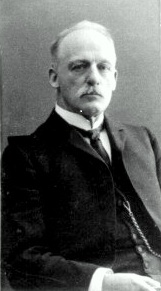Henry Suermondt
Henry Suermondt (born September 3, 1846 in Aachen , † July 3, 1930 in Berlin ) was a German entrepreneur and gentleman rider .
Life
Henry Suermondt was the son of the entrepreneur, art patron and founder of the Aachen Suermondt Museum Barthold Suermondt and Amalie Cockerill, a daughter of the steel entrepreneur James Cockerill . After a brief career as an officer with the Hussars and a commercial training, Henry Suermondt was a member of the supervisory board from 1870 to 1876 and a full member of the board of directors of Rheinische Stahlwerke , which his father had founded in Paris in 1870 as the Société Anonyme Aciéries du Rhin from 1876 to 1877 and in which he was President of the Supervisory Board from 1870 to 1878.
Since July 1889, Henry Suermondt was the registered owner of the Hohenschönhausen manor and partner in the "Land Acquisition and Construction Society of Berlin" founded in March 1893. This company was entered in the land register in June 1893 as the owner of the Hohenschönhausen manor . From 1893 onwards, the "Hohen-Schönhausen Colony" began building single-family houses on the manor (between Orankesee and Berliner Straße ).
In 1912 the Weißenseer Weg in Hohenschönhausen was given the new name Suermondtstraße .
Henry Suermondt owned what was then the largest German stud in Werne in the triangle of Münster , Hamm and Dortmund . Together with his younger half-brother Otto Suermondt , he was one of the most successful riders on the German racing courses of the time and won the German men's championship in 1887 and 1888, among others.
In addition, Henry Suermondt founded the Weiherhof stud, based on the Weiherhof estate in Düren, and the Gut Haidchen stud in his home town of Aachen, in the immediate vicinity of the family home at Herffs-Erb in the Aachen forest across from Alt-Linzenshäuschen . Together with his half-brother Otto, Henry campaigned for the continuation of the horse races, which his grandfather James Cockerill co-founded, on the Brander Feld at the gates of Aachen. For better promotion, they jointly founded the Aachener Rennverein in 1870 , which leased the area in question and was now responsible for hosting these races for the next few years.
Henry Suermondt died unmarried and found his final resting place in the family crypt in Aachen's Westfriedhof .
literature
- Annette Fusenig: How to invent a 'World Equestrian Festival' - The Aachen jumping, riding and driving tournament from 1924 to 1939 , dissertation, Aachen 2004, p. 28ff. pdf
Web links
- Suermondtstrasse. In: Street name lexicon of the Luisenstädtischer Bildungsverein (near Kaupert )
- Genealogical and historical records of the Becker family with numerous pictures and other sources
| personal data | |
|---|---|
| SURNAME | Suermondt, Henry |
| BRIEF DESCRIPTION | German entrepreneur |
| DATE OF BIRTH | September 3, 1846 |
| PLACE OF BIRTH | Aachen |
| DATE OF DEATH | 3rd July 1930 |
| Place of death | Berlin |
